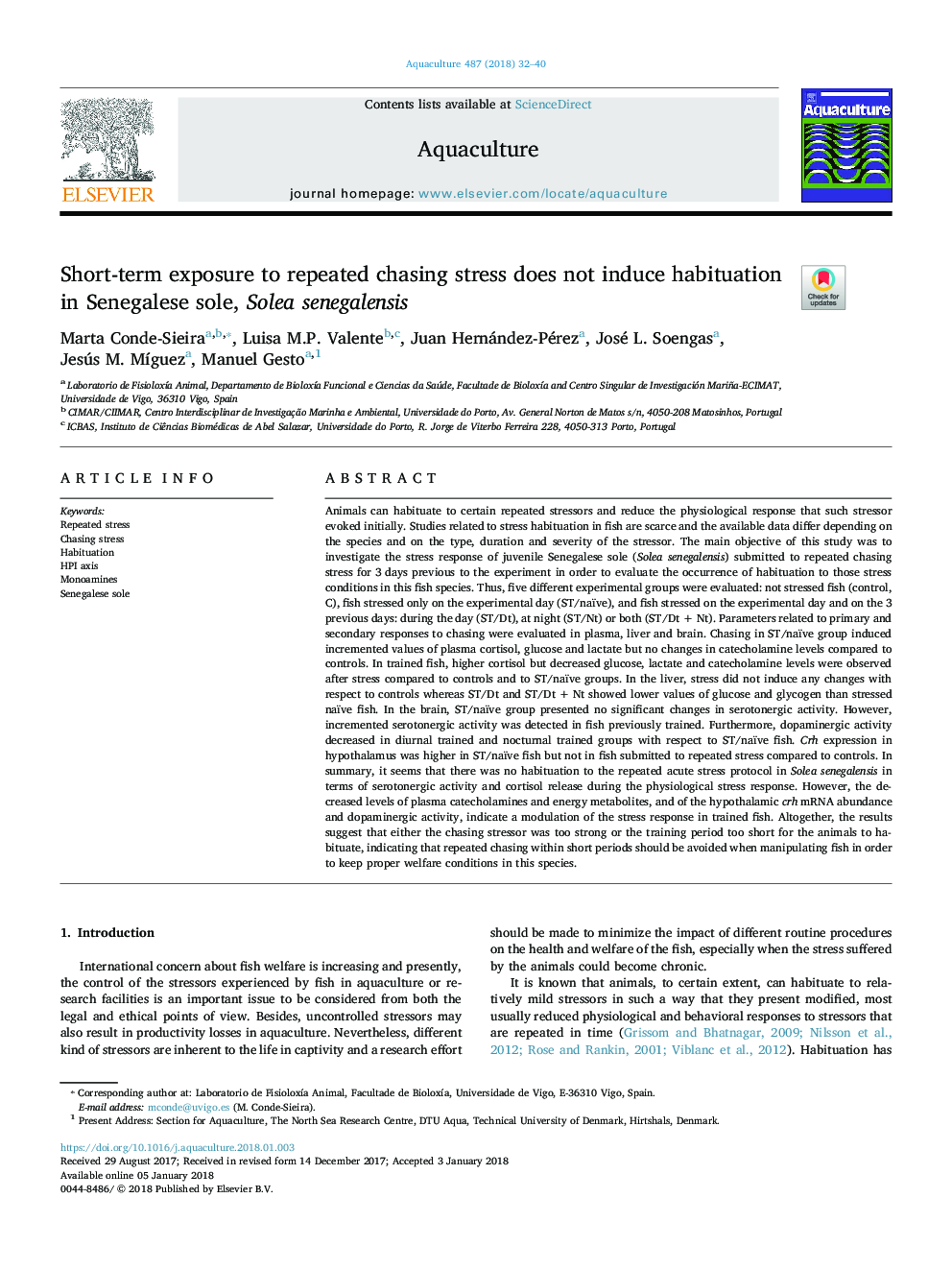| کد مقاله | کد نشریه | سال انتشار | مقاله انگلیسی | نسخه تمام متن |
|---|---|---|---|---|
| 8493427 | 1552801 | 2018 | 9 صفحه PDF | دانلود رایگان |
عنوان انگلیسی مقاله ISI
Short-term exposure to repeated chasing stress does not induce habituation in Senegalese sole, Solea senegalensis
دانلود مقاله + سفارش ترجمه
دانلود مقاله ISI انگلیسی
رایگان برای ایرانیان
کلمات کلیدی
موضوعات مرتبط
علوم زیستی و بیوفناوری
علوم کشاورزی و بیولوژیک
علوم آبزیان
پیش نمایش صفحه اول مقاله

چکیده انگلیسی
Animals can habituate to certain repeated stressors and reduce the physiological response that such stressor evoked initially. Studies related to stress habituation in fish are scarce and the available data differ depending on the species and on the type, duration and severity of the stressor. The main objective of this study was to investigate the stress response of juvenile Senegalese sole (Solea senegalensis) submitted to repeated chasing stress for 3 days previous to the experiment in order to evaluate the occurrence of habituation to those stress conditions in this fish species. Thus, five different experimental groups were evaluated: not stressed fish (control, C), fish stressed only on the experimental day (ST/naïve), and fish stressed on the experimental day and on the 3 previous days: during the day (ST/Dt), at night (ST/Nt) or both (ST/Dt + Nt). Parameters related to primary and secondary responses to chasing were evaluated in plasma, liver and brain. Chasing in ST/naïve group induced incremented values of plasma cortisol, glucose and lactate but no changes in catecholamine levels compared to controls. In trained fish, higher cortisol but decreased glucose, lactate and catecholamine levels were observed after stress compared to controls and to ST/naïve groups. In the liver, stress did not induce any changes with respect to controls whereas ST/Dt and ST/Dt + Nt showed lower values of glucose and glycogen than stressed naïve fish. In the brain, ST/naïve group presented no significant changes in serotonergic activity. However, incremented serotonergic activity was detected in fish previously trained. Furthermore, dopaminergic activity decreased in diurnal trained and nocturnal trained groups with respect to ST/naïve fish. Crh expression in hypothalamus was higher in ST/naïve fish but not in fish submitted to repeated stress compared to controls. In summary, it seems that there was no habituation to the repeated acute stress protocol in Solea senegalensis in terms of serotonergic activity and cortisol release during the physiological stress response. However, the decreased levels of plasma catecholamines and energy metabolites, and of the hypothalamic crh mRNA abundance and dopaminergic activity, indicate a modulation of the stress response in trained fish. Altogether, the results suggest that either the chasing stressor was too strong or the training period too short for the animals to habituate, indicating that repeated chasing within short periods should be avoided when manipulating fish in order to keep proper welfare conditions in this species.
ناشر
Database: Elsevier - ScienceDirect (ساینس دایرکت)
Journal: Aquaculture - Volume 487, 25 February 2018, Pages 32-40
Journal: Aquaculture - Volume 487, 25 February 2018, Pages 32-40
نویسندگان
Marta Conde-Sieira, Luisa M.P. Valente, Juan Hernández-Pérez, José L. Soengas, Jesús M. MÃguez, Manuel Gesto,